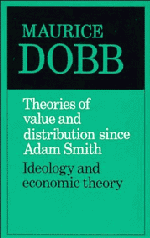Summary
The underlying preoccupation of the early economists of the age of Adam Smith was the notion of individual self-interest as the economic driving-force. From this was fashioned the general conception of an economic system propelled by a momentum of its own, and its motions shaped by specific economic laws that it was the unique contribution of classical political economy to disclose and establish. In Hegel's well-known phrase, “out of the actions of men comes something different from what they have consciously willed and intended”. The idea of the potentially creative force of individual self-interest harks back to the “private vices public virtues” of Mandeville's Fable of the Bees (despite Adam Smith's dismissal of this as “wholly pernicious”); it is of course the substantial kernel within the metaphysical husk of Smith's “unseen hand”; and to this even the Theory of Moral Sentiments was germane as being concerned with exploring human motivation, which was the core of the self-acting bourgeois order. This demonstration of a mechanism within the affairs of men, with which uncomprehending meddling of sovereign or statesmen was incompatible, was the crucial innovation in human thinking about society, essentially replacing older thinking couched in terms of ‘natural right’, and not continuing it as has sometimes been alleged. As Lord Robbins has said, although Smith “so frequently uses the terminology of Naturrecht”, his “arguments are so consistently utilitarian in character”.
- Type
- Chapter
- Information
- Theories of Value and Distribution since Adam SmithIdeology and Economic Theory, pp. 38 - 64Publisher: Cambridge University PressPrint publication year: 1973



